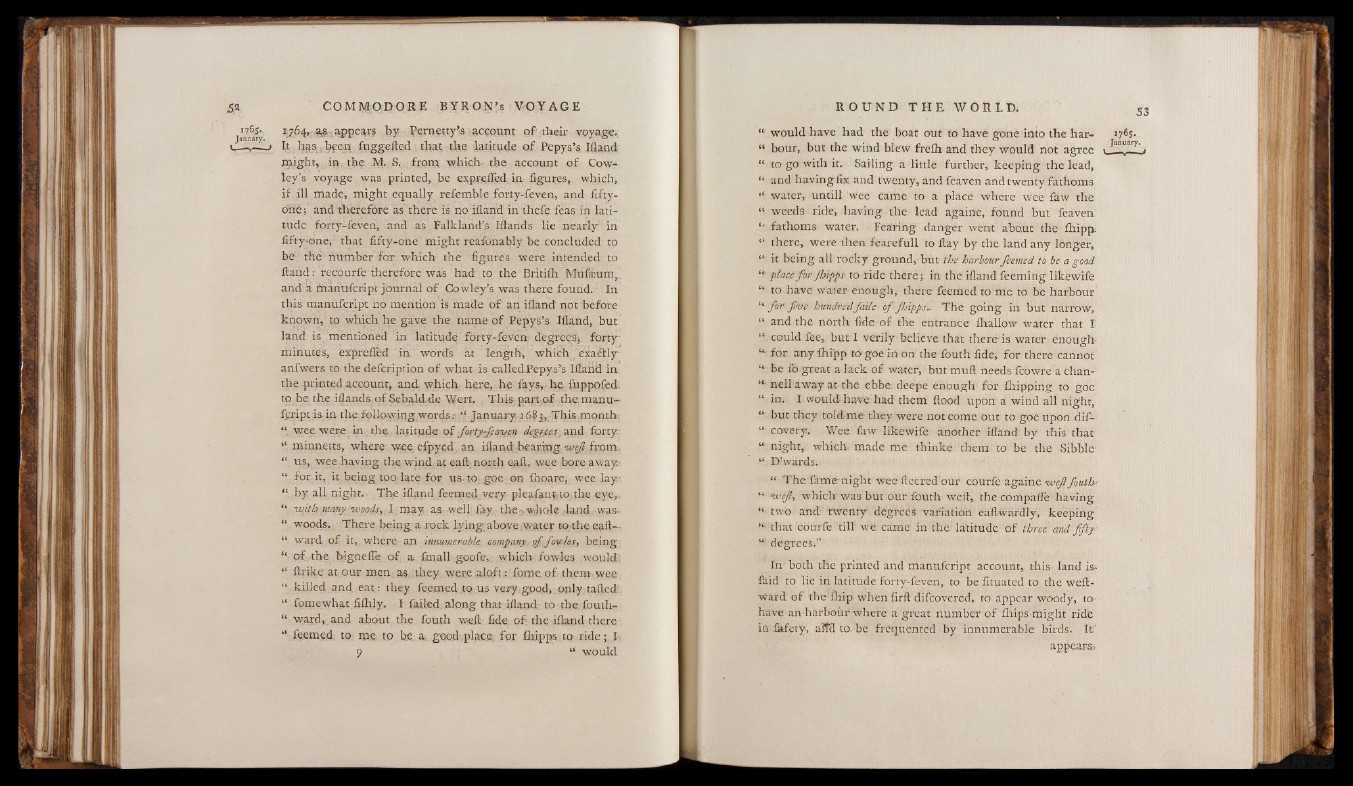
1^ 4 , appears by fl^rnetty’s ;ac?punt o f their voyage,
v— > It bfts been fuggefted that th.§ latitude o f Pepys’s Ifland
might, ip the ML S, from, which, the account o f Cowle
y ’s voyage was printed, be exprefled in figures, which,
i f ill made, might equally referable forty-feven, and fifty-
one; and therefore as there is noifland in thefe feas in la th
t-ude forty-feven, and as Falkland’s Iflands lie nearly in
fifty-one, that fifty-one might reafonably be concluded to
be1 the number fo r which the figures were intended to
Hand: redourfe therefore was had to the Britifh Mufium,,
and a fhamifcript journal o f Cowley’s was there found. In
this manufcript no mention is made o f an illand not before
known, to which he gave the name o f Pepys’s Ifland, but
land is mentioned in latitude forty-feven degree'^ forty
minutes, exprefled in words at lengthy which exactly
anfwers to the defcription o f what is called Pepys’s Ifland in
the printed account, and which here, he fays,.-lie fuppofed:
to be the iflands of Sebald.de Wert. This, par.hof the; manufcript
is, in the following words;: “ January 16$ 4, This ,months
wee were in the latitude o f forty-^eayep deg-rpes r and forty'
“ minnetts, where wee efpyed an ifl-aud bearing -weft from;
us, wee having the wind, at eaft: north eaft, wee bore aw a y
“ for it, it being too late for us. tO gqe on fhoare, wtee la y
“ :by all, night. The ifland feemed.very pkafant.to.the eye,
“ nfith, many/woods, I may as.-wellfay the'whole .land -was,
“ woods. There being a rock lying, above w ater to-the eaft—
“ ward o f it, where an innumerable company; (ffovdos, being
“ o f the bagnefle of. a final 1 goofe,. which fowles would-
“ ftrike at.our, men, as they were.aloft,: fomeof. them wee
“ killed and eat: they feemed to us very good, only tailed!
“ foinewliat fiflily. I failed along that ifland to the fouth—
“ ward) and about the fouth well fide of; the ifland there
“ feemed to me, to be a good,place for Ibipps to ride; I-
9 “ would
“ would have had the boat out to have gone into the har- 176s-
“ hour, but the wind blew frefh and they would not agree ,
“ to go with it. Sailing a little further, keeping the lead,
“ and having fix and twenty, and feaven and twenty fathoms
“ water, untill wee came to a place where wee faw the
weeds ride, having the lead againe, found but feaven.
“ fathoms water. Fearing danger went about the fhipp.
“ there, were then fearefull to flay by the land any longer,
“ it being all rocky ground, but the harbour feemed to he a good
“ -placefor Jhipps to ride there; in the ifland feeming likewife
** to have water-enough, there feemed to me to be harbour
“ for ji-ue hundred faile offlnpps- The going in but narrow,
“ and the north fide o f the entrance fhallow water that F
could fee, but I verily believe that there-is water enough-
% for any Ihipp to goe hi on the fouth fide; for there cannot ’
“ be fo great a lack o f water, but mull needs fcowre a chan-
nell away at the ebbe: deepe enough for {hipping to goe
I in. I would- have- had them flood upon a wind all night,
“ but they told me they were not come out to goe upon dif—
“ covery. Wee faw likewife another ifland by this that
“ night, which, made me thinke them to be the Sibble-
“ ©'wards,
“ The fam m igh t wee fleered our courfe againe -weft fouth<
u -weft, which-was but our fouth weft, the compafle having
two and twenty degrees variation eaftwardly, keeping
“* that courfe till'- we came in the latitude o f three and fifty
W degrees.”
In both the printed and manufcript account, this land is.
faid to lie in latitude forty-feven, to be fituated to the weft-
Ward o f the fhip when firfl difeovered, to appear woody, to
have an harbour where a great number o f fhips might ride
in fafety, affdto be frequented by innumerable birds; It;
appears;